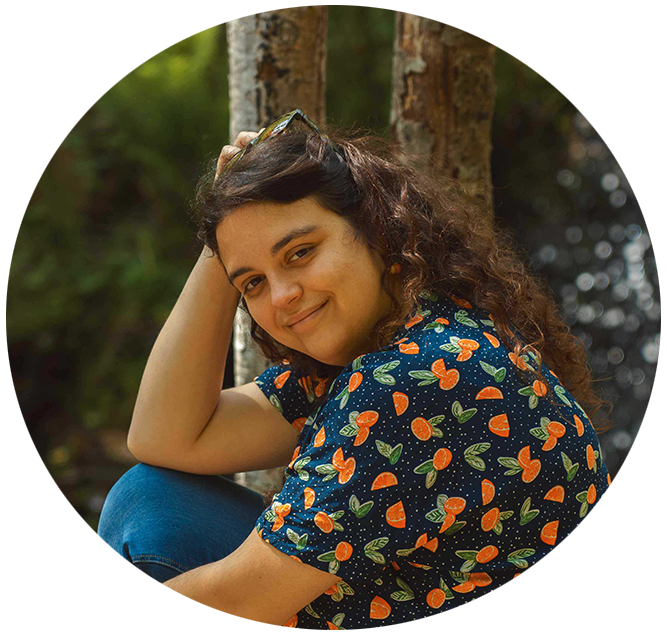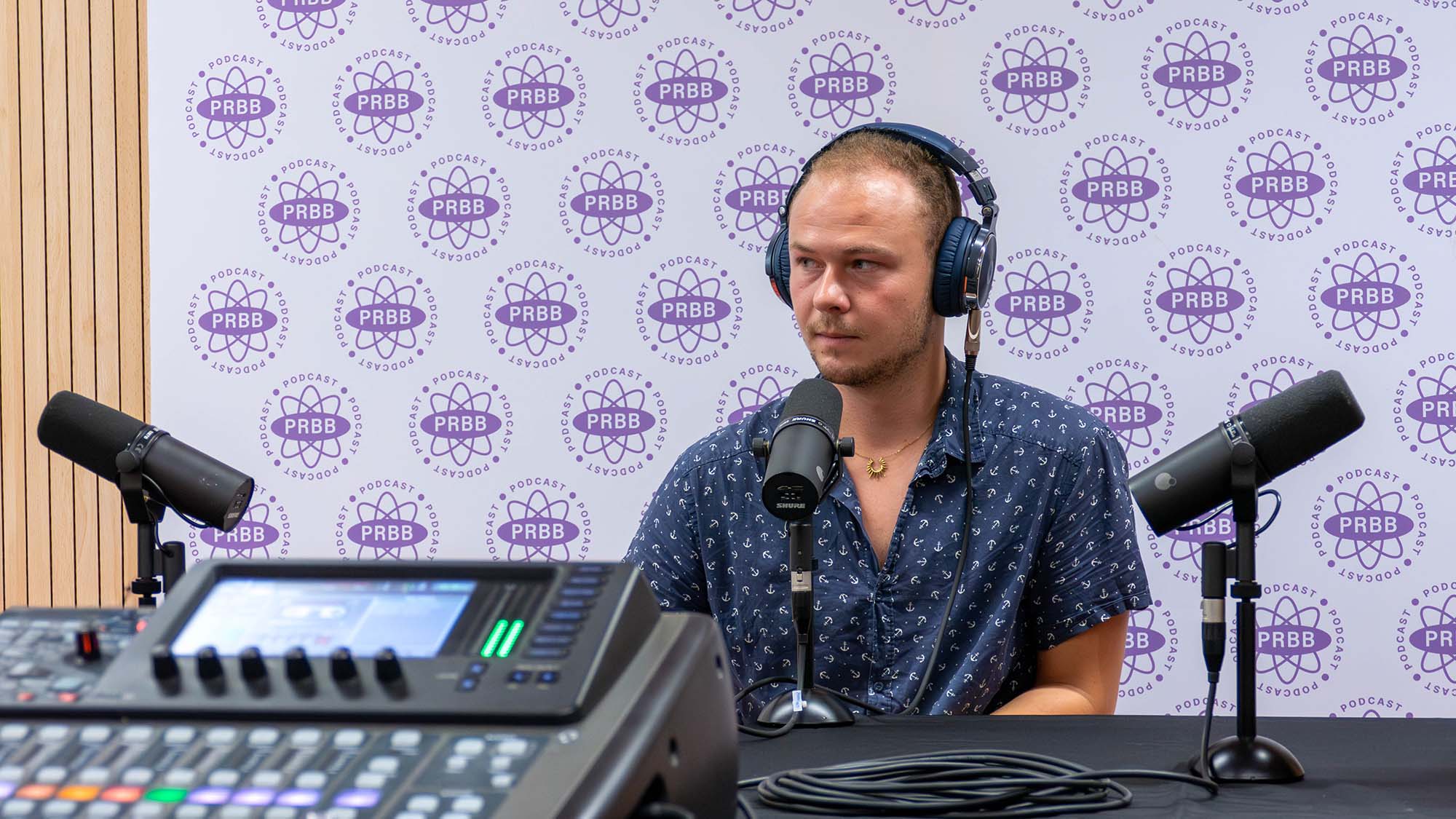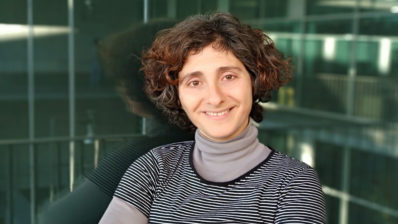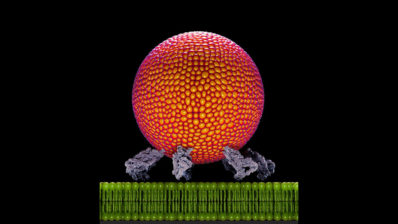Here at the Barcelona Biomedical Research Park (PRBB) we are still committed to scientific dissemination over the radio. And after the launch of ‘La Mare de la Ciència’ and ‘Absolutos y Relativos’ , the podcasts in Catalan and Spanish, respectively, we are now launching a new audio series in English: “Science With a View”.
The Park’s new production brings together two researchers from the PRBB who are experts in their fields. Together, they will focus on key issues in science so that the audience can get to know their points of view and opinions. We will discuss science in its real-world context, debating its applications. And through to the various cross-cutting topics that we will present in each episode, we will openly talk about the challenges facing the scientific community in a society that is constantly evolving.
Chris George, proposal developer at the Hospital del Mar Research Institute (HMRIB), will lead us through topics as diverse as the fundamental elements for understanding cells, the role of AI in research and field work. To celebrate the release of the PRBB’s new podcasting venture, El·lipse has taken the opportunity to talk to him.
From laboratory to administration
Chris is originally from the United Kingdom, and it was there, at the University of Sheffield, that he obtained his PhD. After finishing his PhD in 2022, he decided to start his career as a postdoc at HMRIB. But, although he liked it, life in the laboratory did not quite suit him: “During the postdoc I realised that it was not for me. I didn’t feel very satisfied working alone in the laboratory, because what really brings me joy is working with people and helping them”.
“Just when I was starting to feel dissatisfied with my laboratory work, this new opportunity came along. It was a matter of being in the right place at the right time” says Chris about the new professional path he took 8 months ago. Since then, he has been working in the Grants and Contracts Department, where he is responsible for supporting the research staffs’ scientific ambitions, assisting them in the drafting and development of applications for European funding. “The direct interaction with people and being able to help them has made me find enjoyment and fulfilment in my work again. Clearly, I can say that it was a great decision”, he adds.
Focusing on scientific communication
Chris explains that apart from his work in research, he is also very passionate about science communication. “I’m trying to develop my skills in science communication, especially in the world of podcasting. Both on my own and now in collaboration with the PRBB”, Chris says. That is why at the beginning of the year he launched his podcast ‘Research Uncorked’, where he interviews scientists in the first stages of their careers.
“I started ‘Research Uncorked’ because I wanted to find a way to give a voice to people in the early stages of their scientific careers. Normally, podcasts tend to invite people already established in academia, and PhD students hardly have a voice in them. I think it’s important, not only to give them a voice, but also for people who are interested in becoming part of the scientific world to be able to listen to real testimonials from the people who are already inside”, says Chris about his podcast.
“While I was still forming the podcast, I was trying to figure out how to make the guests, who often feel self-conscious in front of the microphone, feel comfortable. I was inspired by scientific conferences serving wine at their networking sessions, so I decided to accompany the conversation with a glass of the guest’s favourite drink (hence the title uncorked). So as we drink, I ask them a few easy quick-fire questions about their lives to allow them to relax, and as the episode progresses and the wine works it’s as if we didn’t have a microphone in front of us”, he points out.
This informal podcast offers relaxed, engaging conversations on a wide range of topics, including episodes about research in industry, research into immunoglobulins and haematopoietic cells, the contrasts between careers in academia and industry, and the ongoing challenge of balancing work and personal life. For those who prefer a visual experience, the podcast is also available in video format on YouTube and Spotify.
Science With a View
‘Science With a View’ is the new audio production of the PRBB. A podcast in English that brings together two experts from different PRBB centres to talk about a common theme of their research and a cross-cutting theme about scientific careers. This topic also allows us to explore the opinions of our community in the section ‘the views of the PRBB’.
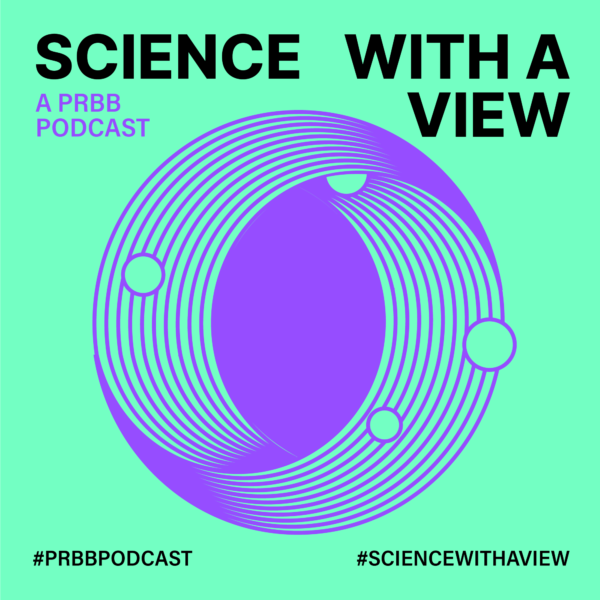
The two-guests format has, as Chris explains, been a challenge for him. “Having to work with two people means having to make sure that everyone has a voice and has space in the episode, without one person overtaking the other. You have to make both guests feel comfortable, so a collaborative space can be created, and questions can be asked between them. It was a different experience, but I would say that it was even more fun. In a way, I felt that the weight I used to feel for the episode to go well was lifted from me”.
In this first season of ‘Science With a View’ we will be treated to the passion and expertise of the interviewees as they delve into a wide range of topics. Throughout the upcoming Thursdays in November, we’ll have the chance to explore the groundbreaking research conducted at the PRBB’s various centers and go through the challenges researchers face throughout their careers. We hope to inspire a truly international audience as we try to show who we are to the world. Our first release will contain the three following episodes:
- “AI in action: Redefining the future of science and Health”. Mafalda Dias (CRG) and Philippe Mortier (HMRBI) will explain how they use artificial intelligence tools in their research and, together with the voices of the PRBB, we will find out how the scientific community use AI in their daily lives. Now available on all platforms.
- “Beyond the lab: How field work shapes biomedical research”. Marta Álvarez-Presas (IBE) and Sarah Warkentin (ISGlobal) will talk about what field work means in research. We will also hear the opinion of our community to see whether it is necessary to work overtime to be successful in research. Available on 14/11/2024.
- “Unravelling the living cell: What are we missing?” Alfonso Martinez-Arias (MELIS-UPF) and Vikas Trivedi (EMBL Barcelona) will engage in an in-depth debate about our knowledge of cells. And we will be accompanied by the residents of the Park to list the qualities of good supervision. Available on 21/11/2024.
We also asked Chris if he would like there to be a second season of the podcast, and he answered positively. “The truth is that in a second season I would like to put on the table the constant pressure to publish that we have in academia, as well as the pressure to obtain positive results. I think researchers would have a lot to say! Also, in these first three episodes we haven’t covered the subject of cancer, but I think that a good question to develop could be “will there ever be a cure for cancer?” Even if the answer is no, it would be interesting to discuss what the treatment of the disease will be like in the future”, he suggests.
His passion for the radio
But beyond scientific dissemination on the radio, Chris is passionate about the podcast format in itself. “When I was at university, I presented a musical radio programme in which I made my guests choose different songs and then we talked about their musical tastes and their lives. Thanks to this programme I learned that I love the audio/radio format, and the fact that you can listen to it anywhere while you do whatever you want (walking, working…). And that makes it very easy to consume”, he says.
In fact, in addition to presenting these two science podcasts, he is also co-host of ‘Red Wine and Chill’. A much more informal programme, where he and his friend Lux discuss the important things in life. “Although organising the filming and editing of the episodes takes a lot of work, I love doing it. What’s more, I find it very relaxing!”.
When asked if he hasn’t thought about another way to disseminate science, Chris jokes ‘I was thinking about opening a profile on TikTok but I feel I’m too old to join the platform!’.
Thank you very much Chris for the interview and for being part of ‘Science With a View’.
And if you have any suggestions of topics you would like to hear about in our future podcasts, let us know in the comments below!
